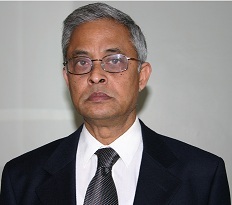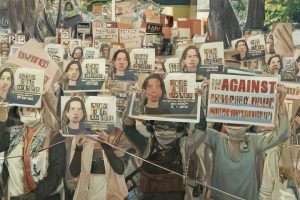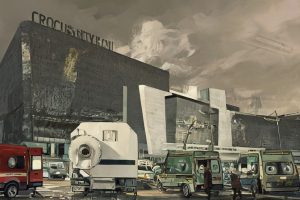By Firoz Mahboob Kamal
The Judicial Murder
At the end, Shaikh Hasina’s autocratic regime could successfully hang one of her political foes. The hanged man was Abdul Qader Mollah –

the assistant secretary general of Jamaat-e-Islami (JI). But that is not the end of Hasina’s politics of vendetta: many more are waiting in the row to be shortly hanged. The so-called International Crime Tribunal (ICT) –although entirely homemade without any foreign jurist, lawyer or observer in its midst, has already declared death penalty for another four. And, many more of the JI and Bangladesh Nationalist Party (BNP) leaders are languishing in the court for the same verdict. Hasina has declared in a seminar in Dhaka on 14th December that no amount of telephone call can stop her from hanging these people. It is an explicit reference to her recent dishonouring to such calls from world dignitaries. The UN secretary general Ban Ki Moon, the USA secretary of state Mr John Kerry, the Turkish Prime Minister Mr Erdogan personally rang Mrs Hasina to stop hanging of Mr Mollah. But such telephone calls could not persuade her to show them any decent response. Now she is publicly announcing: neither such calls will work in the future. She is arrogant enough to finish her foes with the help of the country’s subservient judiciary. Hence, many more judicial killing are in the offing.
BAL’s Indian War
However, Shaikh Hasina is not alone in such political pogrom. She enjoys full support from her mentor -the ruling clique in Delhi. The recent visit of Indian foreign secretary Sujatha Singh has made her more emboldened to stay in power in all possible means. India has huge political investment in Bangladesh since the creation of Pakistan in 1947. And it was highest in 1971. The Daily Naba Barta of Assam made a lead story in its 21th October, 2013 issue that Indian government spent 800 crore Indian rupees in 2008 election in Bangladesh to bring Bangladesh Awami League (BAL) to power. In 2014 election, they planned to spend 1000 crores. As a consequence, whenever BAL comes to the power, they return back to India the best harvest. This is why Bangladesh not only became the huge captive market of Indian goods, but also a servile country to promote India’s strategic interest. Offering transit through Bangladesh to her eastern provinces, killing Islamists leaders and handing over the arrested ULFA (United Liberation Force of Assam) rebel leaders to Indian authority are indeed the proof of such servile role.
In the war against Islam and the Islamists, the BAL is indeed fighting India’s war. India considers Islamists as her real enemy. To fight the Islamist enemies, India takes BAL as the most obedient partner. BAL also considers India as the most dependable master. Hasina understands that without India’s inclusive support her political existence will meet immediate collapse. Hence, what the Indian Army is doing in Kashmir, BAL is doing the same in Bangladesh. And exterminating the Islamists by both judicial and extra-judicial killings is the key strategy. More than 250 opposition activists have been kidnapped and killed only in last 2 months. In order to continue the war against Islamists, India feels that BAL must stay in power. Otherwise, all of her past investment will go in vain and Bangladesh will emerge as another Pakistan on her eastern border. And to keep BAL in power, it needed some changes in the ground rules of the game plan. Shaikh Mujib needed such such changes, too. That was one party system lead by Mujib himself. But his daughter Hasina took another route to strengthen her political grip. In Bangladesh in 1996, the all political parties came to the consensus that the national election should be held only under a non-party caretaker government led by a retired judge of the Supreme Court. It was incorporated in the constitution by all he members of the parliament. It was a landmark decision in Bangladesh’s political history. Such decision was taken as a consequence of election rigging by all partisan governments of the past. It made democratic transition more transparent and made election rigging quite difficult. But after election victory in 2008, Hasina changed her mind. She wants to stay in power but all means. And the non-party caretaker system was perceived as a big hindrance to that end. Hence she annulled the caretaker system by a constitution amendment by her brute majority in the parliament.
Politics of conspiracy and annihilation
The next election is on 5th of January, 2014. Hasina is now running the whole show on her own: already 154 MP candidates of her own party and ruling the alliance are declared elected unopposed out of 300 seats of the parliament. She knew that she cannot escape an electoral wipe-out in the forthcoming election -as was demonstrated by her party’s defeat in all recent city corporation elections. So she conspired to win the election before the day of election. She is using her embedded party men in the judiciary, police and Army’s Rapid Action Battalion (RAB) to exterminate her opponents so that her rigged victory goes down unopposed in the public. She is not ready to tolerate any viable opposition to her power-grabbing politics. Her father Shaikh Mujib introduced one party BASAL system to impose his one-man rule. The ex-President Ershad, Hasina’s political partner since 2008 election, denied endorsing such one party election. As a consequence he was arrested, and still being pressurised to be fully subdued. Almost all the central and district leaders of JI have been arrested; and only a few could escape the arrest by going underground. All of the JI’s central, district, sub-district and union level offices are locked. The government does not allow JI and its student wing Islami Chatra Shibir (ICS) to hold any public gatherings and procession. Whenever they bring out any procession, they meet with police firing and tear gas. Most of the BNP leaders are also arrested. John Pilger has rightly captioned his recent article on Bangladesh, published in the Guardian on 15/12/13, “The prison that is Bangladesh”. The JI leader Abdul Qader Molla was indeed the victim of such annihilation project.
The Extra-judicial Killing
Apart from judicial killing, the extra-judicial killing by the police and the Rapid Action Battalion (RAB) is so rampant that only on one day on 14th December more than 14 people are killed. Of them, 8 are killed in a small town of Companigonj in Noakhali. On 15th December, JI called for country-wide strike. On that day, the police and the RAB killed 9 people and wounded about 300 people and arrested 200. On 13th December, the RAB brutally killed Dr. FAiz Ahmed -a popular medical doctor cum social worker and philanthropist in the district of Lakhmipur. He was known for free treatment for the poor patients. His wife Marjia Faiz reported to the press that in the middle of the night, several armed RAB cadres broke through the main door of his house. They took the doctor to the roof and shoot him. Dr. Faiz Ahmed denied going to the roof top, rather asked them to take him the police station. He body was thrown onto the ground from the roof-top of the building and the body was taken away. After a long searching, the family discovered his body in the local hospital. The hospital doctor revealed that somebody left him in front of the hospital without informing the staff. He was found dead and the body showed marks of bullet injury and torture. Only crime of Dr. Faiz Ahmed was that he was the vice amir (chief) of JI of the local district. The case tells a lot about Hasina’s heinous design. The country’s judiciary and the prosecution have little interest to bring these killers to justice. Their only mandate is to chase the political enemies of the ruling clique, not the accomplice of the government sponsored murder. =
The Killing Industry
In any autocratic rule, fair trial is the first casualty. The trusted accomplices of the tyrant not only get embedded in the administration, police and security services but also in the judiciary. They become the part and parcel of the tyrant’s killing apparatus. Annihilation of the political opponents flourishes as a state run industry. So the judges in Turkey could easily hang the elected Prime Minister Mr Adnan Menderes. The judges of Egypt, too, could overlook the recent killings of more than thousand people by the Army, but didn’t hesitate to hang Syed Qutb and others on concocted grounds. The case of Bangladesh is no different either. One of the embedded Bangladesh Supreme Court judge is Surendra Kumar Sinha. He told one of the ICT judge Mr Najmul to give some quick death sentence verdicts, and in exchange promised him to appoint him as a Supreme Court judge. Mr Najmul revealed that in his Skype conversation with one of his friend in Brussels. During the rule of Shaikh Mujib -the father of the current Prime Minister Hasina, 40 thousands political opponents were killed without any trial. After killing the Marxist leader Mr Shiraj Sikder under police custody, Mujib rejoiced in the parliament by sarcastically asking “where is Shiraj Sikder?”
The defence council for Mr Molllah told the press that his client was denied a fair trial. Mr Mollah was charged with the alleged crime of killing six family members of a single family in Mirpur in the city of Dhaka and also of rape. The single witness of the case was Momena Begum – a daughter of the household. She was only 13 at the time of episode; and claimed that she witnessed the killing while hiding under the bed. She gave three different narrations at three different places. The Independence War Museum in Dhaka recorded her statement that she was not in the house at the time, and was told by others that someone named Qader Mollah was the killer of her father and other family members. The killing happened 42 years ago. How could one recollect and identify a real killer after such a long time? As a matter of chance Abdul Qader Mollah of a village in Faridpur happened to have the same name as had the alleged killer in Mirpur in Dhaka. Such similar names exist in every locality in Bangladesh. Can it be considered a valid proof for his involvement in the alleged killing? In a civilised country, a court never issues death sentence relying on dubious statement of such a single witness. But in Bangladesh, the ruling clique faces dire political necessity to manufacture such ground to justify annihilation of its political foes. The International Crime Tribunal (ICT) has turned into a huge factory to manufacture such artificial grounds to hang the politically targeted people. Shaikh Hasina has deployed hundreds of cronies with fat salaries to do the job. And Abdul Qader Mollah has been made the targeted victim. He was not given the legal right to appeal in the supreme court. The Amnesty International remarked on his case by saying: “This is the first known case of a prisoner sentenced to death directly by the highest court in Bangladesh. It is also the first known death sentence in Bangladesh with no right of appeal. Death sentence without right of judicial appeal defies human rights.
A Total Fabrication
The alleged killing took place in April in 1971. Mr Abdul Qader Mollah was 22 at the time, and was studying Physics in the University of Dhaka for his Masters. Since the university was closed in March due to political turmoil and the military action, he left the university campus for his parenteral home in a remote village of Faridpur. In those horrendous days, most of the university students did the same. Hence his presence in Mirpur in Dhaka in the month of April to carry out the alleged killing is a total fabrication. The court did not engage to understand why he should stay in Dhaka in those awful days? Mr Mollah was a student, and he had neither a job nor a house in Dhaka. Hence he did not have any discernible reason to stay in Dhaka. In those days, the only purpose of his stay in Dhaka was the study in the university; and that too, came to a standstill due to political turmoil. Even those who had a job or owned a house in Dhaka, they left the city for better security. Why the court should think otherwise in his case?
Moreover, crime never takes place without an explicit or implicit motive. No one throws a stone at anybody without a motive, let alone killing him. Hence it was the duty of the judges and the prosecution team to discover such a motive in Mr Mollah’s case. To attribute any manufactured motive to an innocent man is itself a big crime. And the state prosecution and the judges did that crime in his case. Momena Begum’s family was not a personal foe of Abdul Qader Mollah. Her family was not known for any political prominence either. Then why should he kill 6 persons of that family? In 1971, ethnic hatred based on ethnic and linguistic differences reached its climax due to Shaikh Mujib’s jingoistic Bengali nationalism. His people killed thousands of non-Bengalis who came from India after creation of Pakistan in 1947 to enjoy safe haven. The non-Bengalis too killed Bengalis to take the revenge. Thus, thousands of innocent Bengali and non-Bengalis were slaughtered only to feed the hatred. Dhaka’s Mirpur area and Momena Begum’s family was not immune to that. But such hatred cannot fit into Mr Mollah’s case. Even in 1971, the JI activists, for their pan-Islamism, were known for their distinctive character for surpassing the linguistic or ethnic barriers. Moreover, Momena Begum’s Bengali ethnicity could not have any reason to instigate another Bengali like Mr Mollah to kill her whole family. It beggars belief. But the judges did not show any judicial acumen to understand that basics. Thus, the hanging of Abdul Qader Mollah is itself a showcase revelation of the dismal failure of the judiciary in Bangladesh. So the country is fully set for presenting many more hanged Abdul Qader Mollah in the future. Already another four JI and BNP leaders are in the row. The country has already made world records by becoming the most corrupt country in the world for five consecutive years. That too started with Hasina’s first time premiership. It looks, this time she is determined to make another world record. That’s by turning the country’s judiciary into a hanging industry for the innocents.





9 Comments
Comments are closed.